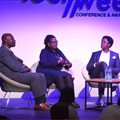
Source: © Egor Kotenko
123rf The SA Social Media Industry Report 2023 shows a strong correlation in South Africa between access to social media and privilege.
The Report, conducted by Ornico and World Wide Worx during the first half of 2023, found that access to social media is equal to privilege and privilege is equal to access to social media.
Talking through the Report findings this morning, in a virtual presentation, Arthur Goldstuck from World Wide Worx, says that most social media apps show a direct correlation between usage and privilege.
“In this country, social media usage is strongly connected to privilege. The higher the SocioEconomic Level (SEL) the most likely social media usage.”
He adds: "This is especially true for Facebook and Instagram, but even applies to TikTok and Twitter, while LinkedIn is slighted different and more scattered, the same still holds true.
“There is also a correlation between race and SEL on the one hand, and both general use and highly active use on the other."
He states in the Report: “It is a reminder that South Africans on social media must check their privilege, and is a key theme in our analysis of each individual platform in this report."
The rise of Artificial Intelligence
The Report shows the rise of AI, and its emergence as a game-changer in the social media landscape.
"Leveraging advanced algorithms and machine learning, AI has revolutionised how we interact, consume content, and do business on social media platforms,"says the Report.
It warns that as we embrace the application of AI in social media, "it is important to be mindful of the associated risks and proactively safeguard ourselves, our brands and our audiences”.
With 81% of the internet user group on social media, it comes as no surprise that AI has garnered a lot of conversations in South Africa since the release of ChatGPT, particularly in the social media and digital marketing fields.
ChatGPT: Reservations about its long-term impact
The Report delves further into ChatGPT and found that South Africa was amongst the top 20 countries mentioning ChatGPT upon its release in 2022.
But it also says that when any disruptive technology emerges, it is natural for people to feel uneasy, and AI is no exception.
“Our admiration for the potential of AI is undeniable... however, the sentiment analysis towards ChatGPT paints a different picture, with 82% neutral, 13% negative and only 5% positive sentiment."
The Report further states that although we are curious and see its value, we have our reservations about its long-term impact.
The Big Five continue to dominant
The Big Five have solidified their dominance of social media in South Africa, with Facebook, TikTok, Instagram, Twitter and LinkedIn all enjoying strong penetration of their target audiences.
South Africa’s social media landscape continues to be dominated by Facebook (56,7%).
TikTok (30,6%) has experienced tremendous growth and has replaced Instagram in the second position.
It is significant that TikTok has such high penetration of the 15+ market in South Africa, since its under-15 audience is probably the strongest of all social networks.
Slightly behind TikTok, Instagram remains relatively high (27,6%).
Twitter (22,5%) still has a significant following despite the fall-out of Elon Musk’s takeover.
LinkedIn (14,7%) places fifth with a strong presence, given the fact that it is a network for professional contact and communication.
Social media platforms key findings
The Report found that:
- Twitter
The most talked-about social network over the past year, thanks to its takeover by an egotistical billionaire, was Twitter. However, the destructive nature of his takeover sent advertisers scurrying for safer realms, and the platform reportedly lost half its regular ad sales.
- Facebook and Instagram
Facebook clawed back a little of its lost lustre after dropping from 96% to 81% last year, coming back to 84%. However, it could not save its sister platform, Instagram, from the biggest drop of all: from 68% to 58% - following a precipitous fall from 86% the year before.
- Spend category shifts
One of the big shifts measured in the Report is in the proportion of companies at the highest spend category and those at the lowest.“Almost the exact percentage of decline in those spending more than R50,000 a month, a 9% drop from 22% down to 13%, was applied to the increase in the lowest category.”
It reports a 10% rise from 54% to 64%, in the percentage of those spending less than R10,000 a month. Interestingly, this coincided with a similar rise in the proportion of companies using social media as a means to lower cost of communications, from 20% to 27%.
Facebook continues to enjoy top position of platforms where most budget is allocated, but its share has plummeted, from 58% to 43%. Similarly, Instagram has fallen from 15% to 4%.
- Social media account handlers?
One of last year’s big shifts has been reversed, namely on the question of who handles social media accounts, with agencies restoring their position after dropping from 27% to 16% last year, and coming back to 30% this year. The PR Team reversed its gain after rising from 3% to 12% last year, falling back to 5%. The Marketing Department still rules the roost, jumping from 31% to 39%, almost returning to its pre-pandemic highs.
- Brand awareness the highlight
On the question of whether social media brought brand returns, the positive response remains rock-steady at 65%. When asked to specify returns, one stood out above all others: Brand awareness. While it did lead the way last year, at 60%, it thoroughly dominated, with 91% citing this benefit. All 10 benefits measured saw an increase, suggesting that there is general satisfaction with social media, if not enough to boost budgets.
- Increased experimentationAs predicted last year, brands have increased their experimentation with new features like short-form video, with Facebook Reels jumping from 30% to 39%. Where a total of 25% of brands said last year they intend to make use of such features in the coming year, 63% indicated that intention this year. In contrast, live event platforms had a dismal year, possibly in response to the failure of Clubhouse to live up to its promise of being the next big social thing.
Get your hands dirtier in 2024
Almost all social platforms saw brands fall in the effectiveness of their use of these, aside from WhatsApp, which saw an increase in Quite Effective and Very Effective use from 24% to 32%.
The Report stresses that "brands tend to be more effective where their social media practitioners also use these platforms in their personal lives, as they would with WhatsApp".
Want to be more effective? "Get your hands dirtier in 2024," it says.
Download the Report here.


























































